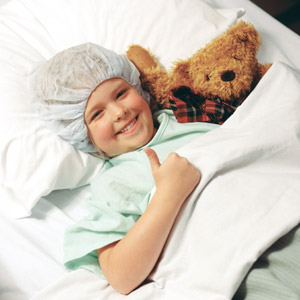 As a parent, preparing a child for surgery is tough. As a parent of a child with many allergies, preparing her for surgery is not only tough but also scary. How will she respond to anesthesia? How will she respond to the instruments used? How will she handle the materials being inserted into her body? How will she handle the hospital bedding, clothing, food? So many questions and concerns to handle before she goes into the surgery.
As a parent, preparing a child for surgery is tough. As a parent of a child with many allergies, preparing her for surgery is not only tough but also scary. How will she respond to anesthesia? How will she respond to the instruments used? How will she handle the materials being inserted into her body? How will she handle the hospital bedding, clothing, food? So many questions and concerns to handle before she goes into the surgery.
Recently my daughter needed to have double leg surgery. The surgery was required to fix her severe knock knees which was already causing physical issues and would only get worse with time — from arthritis to severe joint, back, knee and foot pain. We were fortunate that we caught her situation before she stopped growing so the surgery was less traumatic than it might have. But it was still surgery. And as her mom, I was still nervous.
Like all problems, they can seem daunting if you try to deal with them all at once. So break them into manageable pieces. I broke my preparation for her surgery into medications, materials and post-surgery/hospital stay.
I worked with the doctors before the day of surgery and on the day of surgery, to review all medicines (anesthesia, pain medications, etc) and ensure that none of them were either made with or made in contact with her severe allergies. There were some medicines that they took off of her chart and replaced with others – so this is a very important step. I also told everyone who came into contact with her that she had allergies and I ensured they were listed on any paperwork, charts, etc.
Regarding the materials, we worked with the surgeon’s office to understand what materials would be inside her body. (She was going to have plates and screws on the growth plates in both knees). With that information, we worked with the allergist to have skin patches made which our daughter wore for days prior to the surgery. Every few days we visited the allergies and dermatologist to ensure she wasn’t having any reaction to the metals. We were lucky – she didn’t have any reactions.
In terms of the hospital stay, I asked the hospital what I could bring with me. Since my daughter is allergic to most fabrics and detergents, I had permission to bring in her own bedding and clothing to wear in the hospital. They gave me advice on what that clothing style should be. I also asked what types of food she would be able to eat post surgery and I packed in a cooler all of her food. As it turns out, we were lucky at Children’s Hospital in Boston because they actually put all of her allergies in a system which won’t even let you order any food that contains any of her allergens. But if that hadn’t worked out so well, I had plenty of food with me in a cooler.
TIP: As a parent of a child with allergies, we prepare for everything…. we over prepare for parties, for vacations, for school trips… Preparing for surgery is no different. Preparation means a better hospital experience and a calmer, less scary situation. Just remember, preparation can be daunting – so break it into categories or steps and tackle one at a time!
 My daughter Morgan misses many more school days than other children. Her absences are due to allergic reactions and / or her severe eczema. Our agreement with the school is that we have her on a medical plan at school. I highly recommend this for all parents to consider if this option is right for their child. How does it help our daughter? Morgan wants to do well in school. She wants to do her work and be in the classroom. But when she misses several days in a row in a week, these absences create more stress and guess what – stress can be a trigger for new or continued eczema flares. So it can become a vicious circle. With her medical plan, it is agreed that she can take the test or the quiz later – when she’s better. It also means that she can miss more school than is permitted for children not on medical plans and still progress to the next academic year. It also generally means that she can go get extra help from her teachers as well if needed. We’re fortunate that we are in a school district full of caring teachers so Morgan is thriving in school, even with her restrictions.
My daughter Morgan misses many more school days than other children. Her absences are due to allergic reactions and / or her severe eczema. Our agreement with the school is that we have her on a medical plan at school. I highly recommend this for all parents to consider if this option is right for their child. How does it help our daughter? Morgan wants to do well in school. She wants to do her work and be in the classroom. But when she misses several days in a row in a week, these absences create more stress and guess what – stress can be a trigger for new or continued eczema flares. So it can become a vicious circle. With her medical plan, it is agreed that she can take the test or the quiz later – when she’s better. It also means that she can miss more school than is permitted for children not on medical plans and still progress to the next academic year. It also generally means that she can go get extra help from her teachers as well if needed. We’re fortunate that we are in a school district full of caring teachers so Morgan is thriving in school, even with her restrictions.